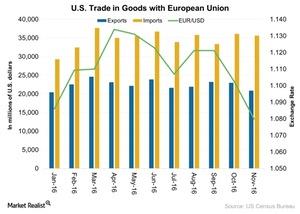Euro Depreciation and Its Impact on Trade with the US
As the US economy gains strength, its impact on euro trade comes significant.
Jan. 23 2017, Updated 6:05 p.m. ET

Euro plunges as dollar rises
The euro continuously depreciated against the dollar in 2016. The reasons for the declining euro include the following:
- slower business activity and jobs growth
- uncertainty surrounding the UK’s Brexit referendum
- member nations opting out of the unified zone
As the US economy gains strength, its impact on euro trade is significant, and the tightening monetary policy stance and growth dynamics in the US economy have also affected the bilateral exchange rate.
Boost to EU trade as currency depreciates
A fluctuation in the nominal exchange rate can impact the economy in numerous ways. Its influence on the real exchange can affect expenditures incurred by the trading partner. The inflation rate of trading partners also impacts the effective exchange rate.
The effective exchange rate is an index describing the strength of a currency relative to a basket of other currencies. Apart from the impact of trading partners, the euro’s exchange rate is determined by its member nations as well. The exposure of member countries to movements in the euro’s exchange depend on the following factors:
- the value of trade outside of the Eurozone
- geographical orientation of business
- the euro’s movement with trade partners
High inflation in the US and euro depreciation will mean an increase in the price level of the dollar versus the euro. This is expected to boost exports in the Eurozone as demand can surge in the US for European goods due to competitive pricing.
In 2016, the US saw a 20% rise in imports, as compared to a 2% rise in exports in the European Union. The fall in the EUR-USD exchange rate makes goods in the Eurozone cheaper, which increases exports. Also, low inflation, as compared to what trading partners experience, tends to enhance the competitiveness of member euro nations.
The Vanguard FTSE Europe (VGK), the iShares MSCI Eurozone (EZU), and the SPDR Euro STOXX 50 (FEZ) rose 0.55%, 0.65%, and 0.91%, respectively, on January 20. Some of the stocks posting gains in these ETFs included Nestle (NSRGF), Banco Santander (BCDRF), Daimler (DDAIF), and Bayer (BAYZF).
